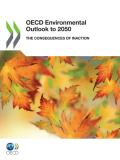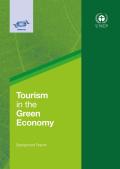This publication offers a general introduction to sustainability impact assessment, which is an approach for exploring the combined economic, environmental and social impacts of a range of proposed policies, programmes, strategies and action plans. Such assessments can also assist decision-making and strategic planning throughout the entire policy cycles. It is not an in-depth or detailed user manual, but rather outlines basic principles and process steps of sustainability impact assessments, drawing on examples from Switzerland, Belgium and the European Commission, among others. This publication is a valuable source of information for policy makers on sustainability impact assessments.
This publication (the 10th edition of Greenhouse Gas Market) brings together carbon market professionals, policymakers, academics and NGOs to provide in-depth analysis and perspective on the main issues affecting carbon policy worldwide. IETA is global in its outreach and the publication features latest developments in current and emerging carbon markets, as well as taking a step back to consider the wider implications of climate policy design and implementation.

Based on joint modelling by the OECD and the Netherlands Environmental Assessment Agency (PBL), this document looks forward to the year 2050 to find out what demographic and economic trends might mean for the environment if the world does not adopt more ambitious green policies. It also looks at what policies could change that picture for the better. This Outlook focuses on four areas: climate change, biodiversity, freshwater and health impacts of pollution, identified as 'red light' issues by the previous 'Environmental Outlook to 2030' publication. This summary was prepared by Eldis.
Nepal is undergoing two momentous transformations-from a rural to an urbanizing economy and from a unitary to a federal state. This book aims at understanding the first of these two transitions: Nepal's journey toward becoming a predominantly urban economy. The study carries out an initial assessment of Nepal's transition from a predominantly rural to an urbanizing economy. This assessment aims at strengthening our understanding of the demographic and economic dimensions of the transition, and exploring the links between urbanization and economic growth in the context of Nepal. This book has five chapters. Chapter one presents an overview of the urban and economic transition in Nepal. Chapter two discusses the spatial patterns of Nepal's rapid urbanization and internal migration-a driving force of urban change from both a demographic and an economic perspective. Chapter three presents an initial assessment of the challenges facing Nepal's cities in urban planning and the delivery of infrastructure and services.
Fostering sustainable industries and industrial development requires the use of effective indicators. Though a multitude of indicators exist, their applicability to sustainable industries remains largely unaddressed to date. In the RISI project, Ecologic Institute reviewed the available scientific knowledge in order to evaluate existing indicators and propose recommendations concerning their usability and the potential need for further indicator development. Ecologic Institute has now published a shorter version of the project results as a Ecologic Brief with forewords by Heinz Leuenberger, Director of UNIDO’s Environmental Management Branch (EMB), and R. Andreas Kraemer, Director of Ecologic Institute.
The Ecologic Brief is tailored specifically to the information needs of political decision-makers and experts in industrial resource efficiency.
This paper focuses primarily on the opportunities that global trade can bring in the transition to the green economy and how the Rio+20 Conference can catalyse the transition by generating new investment, income sources and jobs among countries of varied levels of development. It elaborates by explaining that trade plays an essential role in the diffusion of green goods, services, technologies and production among countries and that this enhances economic growth and contributes to environmental and social developmental objectives.
The report stresses that growth resulting from international trade of green goods and services should be inclusive, building the human and productive capacities of developing countries and stimulating economic diversification, employment for the poor and increased access to basic services such as energy, water, housing, education, communications and transport.
The paper concludes by presenting key issues and considerations that need to be taken into account in the Rio+20 Conference deliberations and how UNCTAD can support countries in their transition to a green economy.
This report contains the first publication of data and indicators that can serve as a basis to analyse and address important policy issues such as resource scarcity and resource security and the design of resource-efficient (industrial) development policies. As the applied methods are consistent with, and fulfil international standards of material flow accounting, the results presented allow comparisons between countries and provide the basis for developing policy targets of all Asian countries.
This pilot study presents comparative data for the following 19 Asian countries: Bahrain, Bangladesh, China, India, Indonesia, Israel, Japan, Jordan, Malaysia, Oman, Pakistan, Philippines, Qatar, Rep. of Korea, Saudi Arabia, Singapore, Sri Lanka, Thailand and Turkey. These countries together represent more than 20% of world GDP and more than 90% of GDP in Asia (excluding Russia and other former countries of the Soviet Union).
Sustainable energy is central to a green economy. This policy brief provides the framework for the discussion on energy for sustainable development. This document describes how access to modern energy services is described as a pre-requisite for economic and social development; explains how the reduction of global energy intensity and the expanded use of renewable energy are ways to the meet the growing energy demand, while mitigating carbon emissions and limiting the damage to the environment; and finally, argues the need for a renewed global effort to make energy a pillar of a Green Economy.

